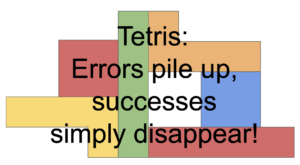Beiträge mit dem Stichwort: ‘self-organization̵
Don’t do Tetris-style Leadership
Did you ever play TETRIS(*)? The essence:Tetris: Errors pile up, successes simply disappear! Don’t be a TETRIS-LEADER to the people around you! Better: (* don’t worry – I don’t tell how old you are )
...Difficult team members…
I was asked: „What is your approach to managing difficult team members?“ I recommend to reflect on your own mindset: what does „difficult team members“ mean? How come that you label or judge others in that way? Typically people have a good reason for acting like they do. So, try to be open-minded, try to find…
...How long do we need a Scrum Master?
In a training I was asked „How long do you need a Scrum Master?“ Let’s just think about FC Bayern München. The well known soccer club. They definitely play world class soccer. What’s your best guess:do they still have a trainer, do they have a coach? Yes, they do. Although they know the rules of soccer.…
...Selbstorganisierte Teams und Agile Leadership? [German]
English text: Self-Managing-Teams [en] Selbstorganisierte Teams sind ein wesentlicher Aspekt von Agilen Arbeitsweisen und Frameworks. Wir haben hier die 8 wichtigsten Punkte zusammengefasst, damit Teams erfolgreich selbstorganisiert arbeiten können und mögliche Aktivitäten, mit denen die Agile Führungskraft dies fördern kann: 1 – Gemeinsames Ziel Ein wichtiger Ausgangspunkt in der Diskussion über selbstorganisierende Teams ist das…
...Self Managing Teams
hier geht’s zur deutschen Übersetzung: Selbst-organisierte Teams [de] I was asked about Self-Managing Teams… my answer got a little longer than anticipated. I think it’s worth reading – so: have fun! I use this picture as my guiding visualization and structure: Perhaps it helps you follow my thoughts and elaboration on the topic. Start in…
...Responsibility (as part of the Responsibility Process)
Sometimes in a coaching session I would draw a horizontal line and ask: in this situation, are you leading „above the line“ or „under the line“? Are you truly leading, creating, forming or are you in the passive state of a victim of others, the system, yourself and your own thoughts of constraints? Somewhere I…
...Obligation (as part of the Responsibility Process)
My standard example for obligation is the boring department meeting, that we have to attend once a month, so boring and such waste of time! That’s what we think and still – we go there. Interesting and sadly, or not so interesting and even more sadly, each and every time when I tell about this example, my…
...Quit (as part of the Responsibility Process)
One option for a consequence for taking responsibility might be quitting. And quitting is not just quitting your job, it could be any way of you leaving this topic: „Just do it without me.“ „Don’t bother me with this topic.“ „I am out.“ But is it really a responsible decision to leave others handle the…
...Shame (as part of the Responsibility Process)
… and it’s always me… I just can’t do it… never could… never will… After we stop lashing out on others for the responsibility, we project the failure and mistake on ourselves – and make ourselves again the victim of unchangeable conditions of the outside world. Opposite to the steps before (denial, lay blame and…
...Justify (as part of the Responsibility Process)
Justify – there is always a Good Reason! That’s how we grew up – explaining what happened. Making sure that it is not our fault and also not telling on the neighbors kid. So… blame it to some unspecified external root cause, justify your specific follow-up behavior and – in one swoop – you are…
...







